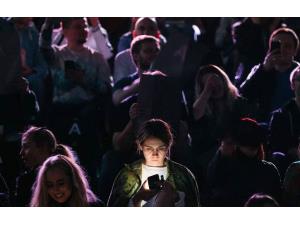



Date:21/08/19
 Using a cellphone to take a break during mentally challenging tasks does not allow the brain to recharge effectively and may result in poorer performance, a new research has found.
Using a cellphone to take a break during mentally challenging tasks does not allow the brain to recharge effectively and may result in poorer performance, a new research has found.
"Cellphones may have this effect because even just seeing your phone activates thoughts of checking messages, connecting with people, access to ever-refilling information and more, in ways that are different than how we use other screens like computers and laptops," said Terri Kurtzberg, Associate Professor at Rutgers University in the US.
Published in the Journal of Behavioral Addictions, researchers analysed 414 college undergraduates who were asked to solve sets of 20 word puzzles.
Some were given a break halfway through, during which they were told to choose three items to buy within a specific budget, using either their cellphone, a paper circular or a computer.
The participants who took phone breaks experienced the highest levels of mental depletion and were among the least capable of solving the puzzles afterwards.
Those who took a break on their cellphone took 19 per cent longer to do the rest of the task and solved 22 per cent fewer problems than those in the other break conditions combined.
Their post-break efficiency and quickness was comparable to those who took no break. Their number of word problems solved after the break was slightly better than those who took no break, but worse than all other participants.
Cellphone breaks not good for your brain: Study
 Using a cellphone to take a break during mentally challenging tasks does not allow the brain to recharge effectively and may result in poorer performance, a new research has found.
Using a cellphone to take a break during mentally challenging tasks does not allow the brain to recharge effectively and may result in poorer performance, a new research has found."Cellphones may have this effect because even just seeing your phone activates thoughts of checking messages, connecting with people, access to ever-refilling information and more, in ways that are different than how we use other screens like computers and laptops," said Terri Kurtzberg, Associate Professor at Rutgers University in the US.
Published in the Journal of Behavioral Addictions, researchers analysed 414 college undergraduates who were asked to solve sets of 20 word puzzles.
Some were given a break halfway through, during which they were told to choose three items to buy within a specific budget, using either their cellphone, a paper circular or a computer.
The participants who took phone breaks experienced the highest levels of mental depletion and were among the least capable of solving the puzzles afterwards.
Those who took a break on their cellphone took 19 per cent longer to do the rest of the task and solved 22 per cent fewer problems than those in the other break conditions combined.
Their post-break efficiency and quickness was comparable to those who took no break. Their number of word problems solved after the break was slightly better than those who took no break, but worse than all other participants.
Views: 447
©ictnews.az. All rights reserved.Similar news
- Azerbaijani project to monitor disease via mobile phones
- Innovative educational system to be improved under presidential decree
- NTRC prolongs license of two TV and radio organizations for 6 years
- Azerbaijan establishes e-registry for medicines
- Azerbaijani museum introduces e-guide
- Nar Mobile opens “Nar Dunyasi” sales and service center in Siyazan city
- International conference on custom electronic services held in Baku
- OIC secretary general to attend COMSTECH meeting in Baku
- Azerbaijan develops earthquake warning system
- New law to regulate transition to digital broadcasting in Azerbaijan
- Azerbaijani State Social Protection Fund introduces electronic digital signature
- Intellectual traffic management system in Baku to be commissioned in December
- Tax Ministry of Azerbaijan started receiving video-addresses
- World Bank recommends Azerbaijan to speed up e-service introduction in real estate
- Azerbaijan to shift to electronic registration of real estate





















